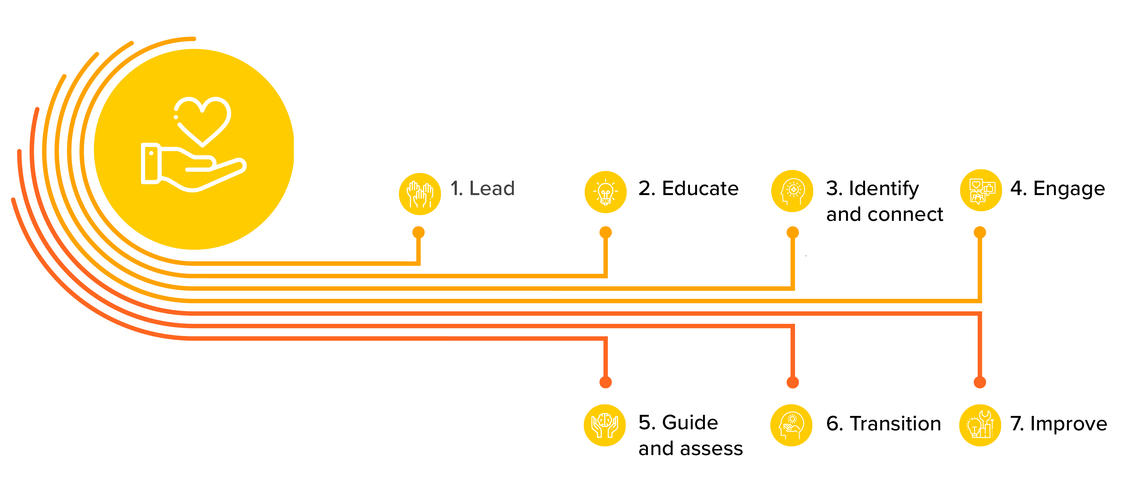
Working together to prevent all student suicides
Suicide Awareness and Prevention Framework: providing support for students
The foundational belief of the UCalgary Suicide Awareness and Prevention Framework is that suicide deaths for individuals under the care of health systems are preventable. We aspire towards long-term system-wide transformation toward safer suicide care for our students using our seven key goals. Our mission is to provide quality, comprehensive, culturally informed, mental health support for individuals experiencing thoughts of suicide. We wish to prevent all suicides by helping individuals receive personalized support through the suicide crisis and connect them to resources that maintain their recovery. We are hoping to strengthen internal and external supports and ultimately help them create an enhanced sense of personal resilience and confidence moving forward.
Anyone can be at risk for suicide. Thoughts of suicide are a common experience for many individuals, often emerging as a response to overwhelming pain or difficulties in life.
We will provide comprehensive care that supports each student as a member of our campus community, prioritizing their immediate safety while also providing support to improve the difficult circumstances and/or mental health challenges that may be connected to their suicide thoughts. With this in mind, the only acceptable goal is zero suicide.
UCalgary’s framework is based on the Campus Mental Health Strategy’s vision to create a caring campus community. It focuses on responsiveness and reflects principles within the Zero Suicide Framework created by the Zero Suicide Institute and the Suicide Prevention Resource Centre.
Our guiding principles
In promoting mental health as part of the Campus Mental Health Strategy, the University of Calgary aims to be:
We actively support and promote the mental health, well-being, and success of the campus community. We are an inclusive community that promotes mental health education, understanding, and awareness.
We leverage and contribute to local, national, and international evidence and perspectives to strengthen our collective capacity to support mental health.
We build capacity and strengthen ourselves to inspire further growth and innovation in promoting and supporting mental health.
We are responsive to the mental health needs of the campus community.
We commit to a culture of continuous improvement in the domain of mental health.
In addition, as a foundation for our guiding principles, UCalgary will engage with lived experience and diverse and vulnerable populations.
Working towards zero

The following goals will guide our path towards greater suicide awareness and support for our campus community.
1. Lead
Lead a university-wide safety-oriented culture committed to suicide prevention, reducing stigma and promoting a community of caring.
2. Educate
Educate the campus community to provide competent, confident, and caring supports to encourage help seeking and help offering.
3. Identify and connect
Identify students with suicide risk via skills training, on-line resources, and within Student Wellness Services’ initial screening and assessment.
4. Engage
Reach out and engage students through supportive outreach. Resources available include counselling/mental health support, physicians, psychiatry, peer support, Faith and Spirituality Centre.
5. Guide and Assess
Guide students at-risk for suicide to helping supports; co-develop an individualized personal support or recovery plan.
6. Transition
Transition students to specialized care and supports when needed and support returns to campus. We will engage with Alberta Health Services and community-based resources when creating these transition pathways.
7. Improve
Improve and communicate policies, processes, and procedures through continuous quality improvement, identifying clear measures for evaluation.
- Clearly communicate all processes and associated guiding documents to the campus community and community partners.
- Develop and improve process and procedures related to suicide prevention and awareness through data-driven quality improvement & evaluation (using clear measures) and continuous quality improvement.
- Promote mental health literacy across campus, building capacity for social connection and access to mental health support.
Advisory Committee
-
Andrew Szeto, PhD, co-chair
Director Campus Mental Health Strategy
-
Sandra Kadhim
Undergraduate medical student
-
Gina Dimitropoulos, PhD
Faculty of Social Work
-
David Kirby
Clinical Services Manager, Distress Centre
-
Dr. Chris Wilkes
Professor, Psychiatry, Section Chief, Child & Adolescent Outpatient & Specialized Services
-
Melanie Grier
Graduate student, Department of Psychology
-
Mara Grunau
Director, Centre for Suicide Prevention
-
Andrew Thompson
Undergraduate student, Department of Neuroscience
-
Brittany Lindsay
Graduate student, Department of Psychology
-
Maya Sohn
Alumna, Department of Neuroscience, Graduate student, Health Sciences.
-
Kome Odoko
Student Support and Case Management Coordinator, Student Wellness Services
For more information, contact
Andrew Szeto, Director, Campus Mental Health Strategy

What’s been getting us through?
We’ve asked the campus community to share what’s been getting you through the pandemic. It can sometimes be the small things, like growing a plant or sharing a kind word, that helps us build meaning during a tough time. These tips will encourage you to keep going – you got this!


